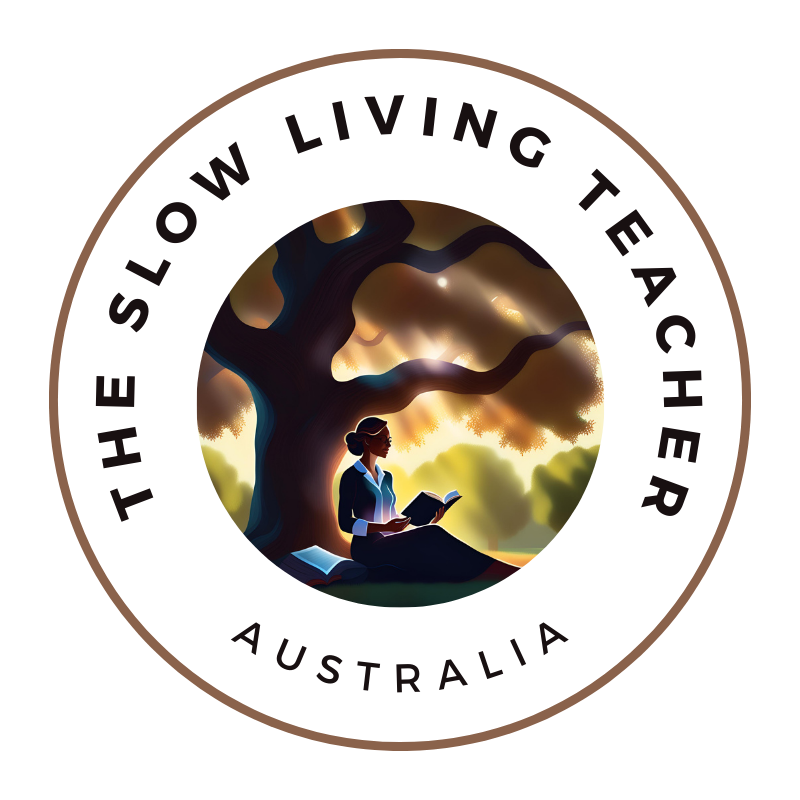Your cart is currently empty!

Signs of Teacher Burnout: The Frog in the Pot
Teacher burnout is like the frog in the pot — slow and sneaky. Here’s how to notice the signs, feel seen, and reclaim your energy.
This post may contain affiliate links. At no cost to you, I may earn a small commission if you click on any affiliate link within my blog.
The Heat We Stop Noticing
The signs of teacher burnout don’t always show up in flames — sometimes they arrive quietly, like warm water slowly starting to simmer.
You know the frog in a pot story, right? If you drop a frog into boiling water, it’ll panic and leap out. But if you place it in cool water and slowly raise the temperature, it’ll stay put — even as things get dangerously hot. That’s the analogy, anyway. A quiet kind of suffering, the kind that sneaks up on you. The kind a lot of teachers know too well.
It doesn’t start with collapse. It starts with saying yes when you wanted to say no. With staying late again to catch up on grading. With smiling through a staff meeting even though your jaw is clenched so tightly it might snap. One small adjustment, then another. The water warms. You adapt. Until one day, you realize you’re cooked.
If you’re reading this, you might already be in that pot — or maybe you just caught a whiff of steam and finally turned your head. Either way, you’re not alone. And you’re not weak or broken or failing. You’re responding, probably in very smart and resilient ways, to a system that keeps turning up the heat.
Let’s talk about what it means to notice the heat — and what it might look like to step out of the pot, even for a little while.
The Slow Boil of a Teaching Career
The frog analogy doesn’t just apply to a rough week or a bad term. It maps frighteningly well onto what teaching has become over the last ten years. The water has been warming for a while.
Once, it might have felt manageable. There were hard days, of course, but also space to breathe. Now? The demands have compounded — year after year — so gradually that many of us didn’t fully register the shift. More paperwork. More testing. More accountability measures, data tracking, safeguarding duties, admin demands, tech platforms, behavior plans. The list swells, inch by inch. And with each new expectation, there’s rarely a subtraction — just an adjustment. Just another tap on the burner.
The workload hasn’t increased overtly. It’s crept in — incrementally, persistently, like condensation on the windows. Manageable at first, until one day you can’t see out anymore.
What’s so exhausting about this isn’t just the tasks — it’s the erosion of autonomy, the sense that no matter how hard you work, it’s never quite enough. That’s the boil. That’s what wears people down without realizing why.
If you feel like teaching used to be sustainable and now feels like a treadmill that’s stuck on incline — you’re not imagining it. You’re not dramatic. You’re just a frog who got wise to the heat.

The Quiet Kind of Exhaustion
Some days, the burnout doesn’t even feel like burnout. It just feels like running on autopilot.
You sit in your car before school, willing yourself to get out. You walk through the halls feeling porous, like every noise and demand soaks into your bones. And somehow, you still teach. You still smile. You still show up.
But that heaviness? That’s not laziness. That’s not a personal failing. That’s what happens when you’ve been swimming in hot water for too long. It starts to feel normal to feel terrible.
And the worst part is, it tricks you. It makes you think, Maybe I’ve just lost my passion. Maybe I’m not trying hard enough. But you’ve been trying harder than anyone should have to. That weariness is information. It’s your nervous system sounding the alarm. Something’s not right.
Try this: Next time your body says “I can’t,” believe it. Even if all you can do is take a five-minute breather in a quiet space. That pause is protest. That breath is a boundary.

The Guilt That Won’t Quit
You think about calling in sick and feel a wave of panic. Who will cover your class? What about the plans? What if your students fall behind?
There’s a particular flavor of guilt that comes with being a teacher. It’s not just about being needed — it’s about feeling indispensable. You’re told you make a difference. And you do. But when that message is twisted, it becomes a trap: If I don’t do it, no one will.
That’s how teachers get caught in cycles of overwork and depletion. Because guilt doesn’t care about your limits. Guilt says: You don’t get to rest. You don’t get to matter. But you do. You absolutely do.
Let’s name it: this guilt is a symptom of a system that runs on self-sacrifice. It’s not proof that you’re selfish. It’s proof that you care. But care without boundaries will burn you to ash.
Try this: Practice saying, “Not today.” Just once. To a request, to a guilt trip, to an internal script. Start small. Watch how the world keeps spinning.
The Fantasy of Walking Away
Every teacher I know has a fantasy escape. Some are dramatic (quitting mid-year to live in a van), some are subtle (a bookstore, a pottery studio, a quiet life somewhere green). You might not even want to actually leave teaching — you might just want the freedom to imagine it.
And that matters. Because teaching often becomes an identity, not just a job. And when that identity consumes you, it’s easy to forget that you have options. That you’re allowed to grow and change.
Imagining another life doesn’t mean you don’t care. It means you still remember there could be something else. That spark is hope. And hope is something the system would rather you not have — because hopeful teachers ask questions. They set boundaries. They get honest.
Try this: Set a timer for 10 minutes. Journal a version of your life where you didn’t have to constantly prove your worth. Don’t edit. Don’t judge. Just let it live.
The Power of Slowing Down
You don’t have to quit to reclaim your peace. Sometimes, the most radical thing you can do is move slower in a system that runs on speed.
A teacher I know started leaving school fifteen minutes earlier each day. Just fifteen minutes. “It felt like stealing time,” she said. “But it was mine again.” That time became sacred. A boundary. A tiny revolution.
These shifts won’t fix everything. But they remind you that you’re still a person. That your life isn’t just a conveyor belt of responsibilities. That you get to take up space.
Try this: Pick one ritual to protect. A hot drink. A quiet lunch. A playlist for your drive home. Let it be gentle. Let it be yours.

You’re Not a Frog. But You Might Be in Hot Water.
If you’re feeling overwhelmed, burned out, or lost — it doesn’t mean you’ve failed. It means you’ve been surviving in increasingly difficult conditions.
You’re noticing the heat now. That’s your power. Whether you leap out of the pot, dangle a foot over the edge, or just take one deep breath today — that counts. That matters.
You don’t have to do it all. You just have to begin noticing that you deserve something gentler.
You’re not alone in this. Not even close.





Leave a Reply